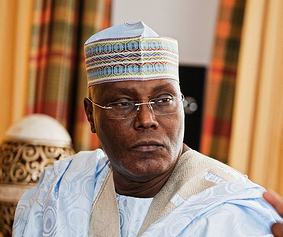
ONE syndrome common among many of the nation’s politicians is party switching. Perhaps, no other politician epitomizes this itinerant movement than former Vice President Atiku Abubakar, who, for the umpteenth time, recently left the All Progressives Congress (APC), for the People Democratic Party (PDP).
Since the return to democratic rule in 1999, Atiku has been in and out of the PDP three times, once in the defunct Action Congress (AC), and, until recently, a member of the All Progressives Congress (APC). What Atiku is seeking in these political parties is obvious: the Presidency. The Waziri Adamawa had begun his quest for the nation’s number one job in 1992, when he, alongside the late business mogul, Bashorun MKO Abiola, sought to become the presidential candidate of the Social Democratic Party, SDP. Atiku lost the SDP presidential primaries to Abiola but his interest in the job did not abate.
The return to civil rule in 1999 presented another opportunity for Atiku to take another shot at the Presidency but he was hampered by his party’s zoning formula, which zoned the seat to the South. Atiku, therefore, shelved his presidential ambition and contested and won the Adamawa State gubernatorial election in 1999. But he would not become governor. Olusegun Obasanjo, the PDP presidential candidate for the 1999 Presidential election chose Atiku, a protégé of his former military number two man, Shehu Yar’Adua, as his running mate.
Obasanjo would later state in his book, My Watch, that some marabouts had told Atiku about his imminent political elevation from governor-elect to vice-president, and that he would eventually become president as he (Obasanjo) would not last in office. This sorcery, Obasanjo claimed, dictated every action taken by Atiku in office. Obasanjo would further claim in his book that choosing Atiku was an error of judgement on his part as he had thought that Atiku’s relatively young age, cosmopolitan worldview and his network of friends would make him an ideal successor. But, the former vice president said Obasanjo is only mad at him for throwing a spanner in his third term bid.
The relationship between both men was marred by this mutual mistrust and degenerated badly as it became obvious that Atiku would love to succeed Obasanjo in office, but the wily OBJ would not allow that. Seeing that Obasanjo was not disposed to his bid to succeed him in office, Atiku left the PDP in 2006 and pitched his tent with Bola Tinubu’s Action Congress (AC), but the crafty Obasanjo was not done with Atiku yet.
He goaded the late Musa Yar’Adua, younger brother of Atiku’s political mentor, Shehu, into becoming the PDP presidential candidate for the 2007 presidential election. Atiku unwittingly took this bait and went into the political contest with a man that was seen as his younger brother. He got a paltry two million votes in that contest and went on political hiatus for a while.
When Yar’Adua, due to his failing health, succumbed to death and was succeeded by his deputy, Goodluck Jonathan, Atiku felt it was time to return to the PDP to challenge Jonathan for the party’s 2011 presidential ticket. But, when it became obvious that fate and tribe were working in Jonathan’s favour, even the ‘detribalized’ Atiku withdrew into the ethnic cocoon and became the Adamu Ciroma-led Northern Elders Forum’s northern consensus candidate for the 2011 PDP presidential ticket. This political gaffe made it obvious that Atiku was not above primordial politics when it suits his political interests. He was roundly defeated in the primary election and could only watch as Jonathan went on to win the 2011 presidential race.
As the 2015 election cycle drew close, the ever-mobile Atiku was on the road again. This time, he was a late entrant into the newly formed All Progressives Congress (APC) and, as usual, sought to become the party’s presidential flag bearer alongside four other politicians, including Muhammadu Buhari. Atiku emerged the first runner-up in the presidential primaries and subsequently became a spectator in the party.
Almost all close watchers of the nation’s politics knew he would leave the party but no one could hazard a time. It, therefore, did not come as a surprise to many Nigerians when he announced his exit from the party last week; he had long been looking at the other side to see if the grass is greener there.
Now back on familiar ground, Atiku can begin to oil his political machinery in readiness for the 2019 Presidential election, but the odds against him are daunting. His flirtation with almost all major parties in the country just to get the seat at Aso-Rock reveals more than just a passionate ambition. Also, at over seventy, the electorate may not want a repeat of a ‘London-based’ president.
Atiku has also not been able to wash himself clean of the myriad of corruption allegations leveled against him. Obasanjo and Kaduna state governor, Nasir el-Rufai, did a lot of damage to Atiku’s credibility in their books, My Watch, and Accidental Public Servant, respectively. His “I don’t give a damn” statement may just not be strong enough for the approval of the electorate. Since the roving bird has taken flight once again in search of the elusive presidential seat, one can only wish him good luck.
Onabanjo writes from Lagos
END

Be the first to comment